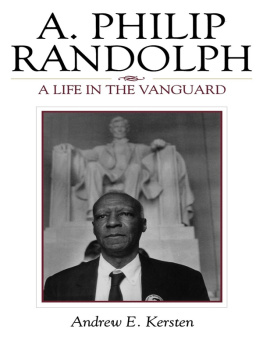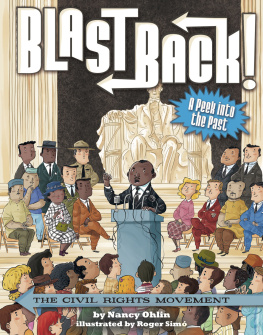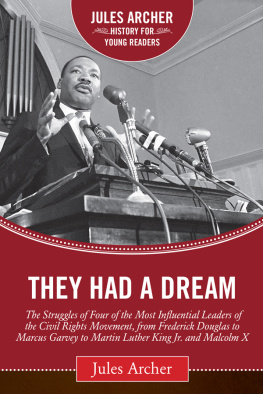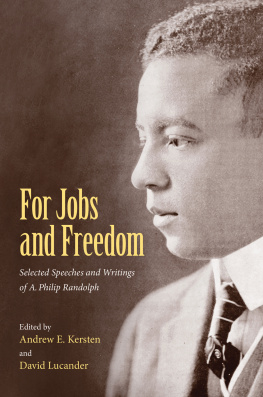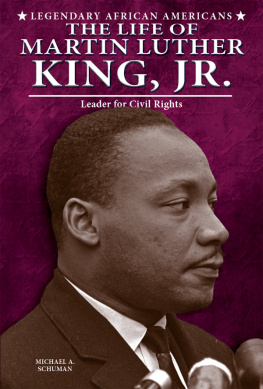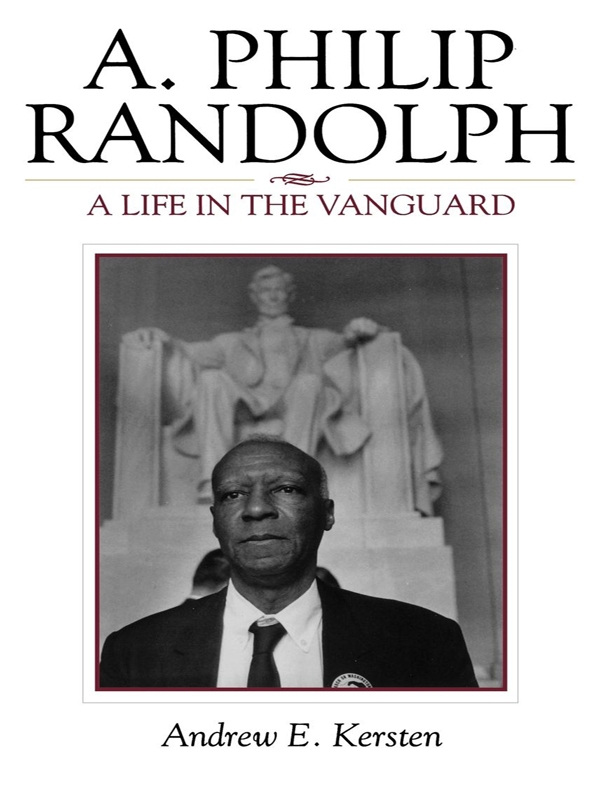Andrew E. Kersten is associate professor of history and chair of the Social Change and Development Department at the University of Wisconsin, Green Bay. He is the author of Race, Jobs, and the War: The FEPC in the Midwest, 19411946 and Labors Home Front: The American Federation of Labor and World War II as well as numerous articles.
Afterword
I dont ever remember a single day of hopelessness. I knew from the history of the labor movement, especially of the black people, that it was an undertaking of great trial. That, live or die, I had to stick with it and we had to win.
A. Philip Randolph
Toward the end of his life, A. Philip Randolph sat down with Wendell Wray, a historian from Columbia University. After a long conversation about Randolphs childhood, his Harlem Renaissance years, and his work as a civil rights and labor leader, Wray asked Randolph to reflect upon his life. What would you have done a little differently? Where do you feel you had any places youd have done it better? Randolph paused and without contrition said, Well, I think in any life and in any struggle, when one looks back, one could say that perhaps here and there an approach might have been different, the level of intelligence of the people might not have been ready for this kind of an effort, and that I should have been more interested in cultivating the established leaders in the race, and perhaps some people thought I shouldnt have started in the American Federation of Labor with an attack on the leaders of the A.F of L. But Randolph had no regrets at all. I told it like I saw it, and so I think in the long run it has helped me. I have an inner satisfaction of having done what I thought was right at the time which I thought was propitious.
This was not egotism. Rather, it was a reflection of how consistent and certain Randolphs thoughts and actions had been over the decades. In the formative years of the Harlem Renaissance, he had discovered socialism and kept the faith for his entire life. A lifelong socialist, he believed strongly that poverty and racial discrimination caused nearly all of Americas problems. Undeniably, African Americans faced special and additional complications, but that did not mean the solution to their struggles was any different from those of the working class generally. Randolph thought that the federal governmentin concert with state and local governmentshad an obligation to improve the lives of Americas poor and minority citizens through innovative, assertive, and progressive reforms. And, he never wavered, even when the politicians whom he trusted did.
In addition to spending his life fighting for labor and civil rights reform, Randolph struggled to energize as many supporters as he could. His political faith encouraged him to foster a vanguard, a group of forerunners who added political weight to Randolphs ideas and were foot soldiers for various demonstrations and marches. Furthermore, it was the vanguards job to convince others to back Randolphs plans for social change. For much of Randolphs life, the Brotherhood of Sleeping Car Porters functioned as an institutional vanguard. But as rail traffic disappeared in the 1960s, so did the BSCP. At the end of this life, it was the A. Philip Randolph Institute, my movement as Randolph called it, which tried to lead the vanguard to further advances.
Before Randolph left the oral history interview, the Columbia historian asked a final question: Do you think history will remember you as a trade union leader or a civil rights leader? I think as both, he replied. But after reflecting for a moment, he decided that he had achieved more as a labor leader. The civil rights movement was perhaps more glamorous but he admitted he had not been able to contact as large an area of people as he had as the BSCPs president. And perhaps that is why so many Americans have now forgotten Randolph. As labor unions seem to have a smaller and smaller impact on our lives, their leaders, their struggles, and their legacies have become blurry recollections of our collective past. But the fight lives on. The poverty and discrimination that Randolph railed against never disappeared. Any future movement to improve the conditions of the working class in the United States most likely will look back for antecedents. Thus, placing A. Philip Randolph into the gallery of great American heroes is merely a matter of time.
Notes
A. Philip Randolph, quoted in a speech by Shirley Chisholm before the House of Representatives, 21 May 1979, Congressional Record 125, pt. 10, 96th Cong., 1st sess.: 12000.
Reminiscences of A. Philip Randolph, 22 August 1972, Columbia University Oral History Research Office, 281.
Randolph oral history, 282.
Randolph oral history, 283.
Note on Sources
There is an abundance of primary and secondary sources that document the life of Asa Philip Randolph. The A. Philip Randolph Papers at the Library of Congress and the oral history of Randolph at the Columbia Oral History Center are essential primary materials. The Federal Bureau of Investigation has an enormous file on Randolph; it is readily available in the FBI reading room or by requesting the document through the Freedom of Information Act. The FBI file on Randolph and other black American leaders is also available on microfilm. Although researchers should use the FBIs information with caution, it still provides a very useful window into Randolphs movements, actions, and thoughts. Other important government sources include congressional hearings, the presidential papers of Franklin D. Roosevelt, Harry S. Truman, Dwight D. Eisenhower, John F. Kennedy, and Lyndon B. Johnson, and reports of civilian and military government agencies. Other useful sources are newspapers, both white and black, as well as Randolphs magazines: The Messenger and The Black Worker. The Messenger Reader (New York: Modern Library, 2000) edited by Sondra Kathryn Wilson is a useful collection of stories, poetry, and essays.
The records of many of Randolphs organizations are also crucial research tools. The Brotherhood of Sleeping Car Porters Papers housed at the Library of Congress are available on microfilm. Unfortunately, the main source of manuscript material relating to the 1941 March on Washington burned in a fire decades ago. However, there are some useful materials at the Franklin D. Roosevelt Library in Hyde Park, New York. Moreover, the microfilmed Records of the Committee on Fair Employment Practice, housed at the National Archives, contain information relating to Randolph and the creation of Executive Order 8802. On issues of desegregation in the military, one should consult the U.S. Armys, Navys, and Air Forces records at the National Archives as well as the related papers at the Truman Presidential Library. Finally, the microfilmed papers of the National Association for the Advancement of Colored People are essential for any researcher studying the African American experience in the twentieth century.

